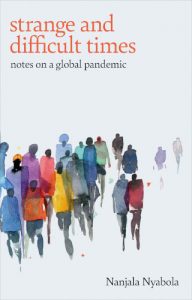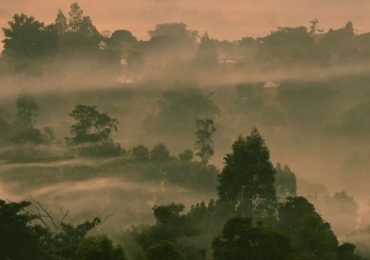The JRB presents an excerpt from Strange and Difficult Times: Notes on a Global Pandemic by Nanjala Nyabola.

Strange and Difficult Times: Notes on a Global Pandemic
Nanjala Nyabola
Hurst Publishers, 2022
Read the excerpt:
Necessary, Righteous Rage
I have to hold on to African American writer Audre Lorde’s reflections on the uses of anger as I write this. Anger is a useful sentiment, and anger in the face of injustice is a human response. I’ve been known to make kumbayah statements in my life and work because, fundamentally, I want to believe that a world defined by justice and inclusion is possible, even in the face of staggering amounts of evidence that a critical mass of people simply does not want that reality to come to pass. So many of us are taught to make ourselves unfeeling of our anger as children because we are warned of its destructive nature. Anger can lead to rash judgments. Anger can lead to violence. Anger can lead to words uttered too quickly that can never be taken back. But Lorde reminds us that anger can be productive: ‘Focused with precision it can become a powerful source of energy serving progress and change’. Anger, sharpened by clarity and aimed at a deserving target, can lay waste to the things that obscure our perception of reality.
Let this anger lay waste to the myths that prevent us from reaching out for a different way of being.
Every African you know who has been paying attention to the world in the time of Covid-19 is angry, and justifiably so. Perhaps not since the HIV/Aids pandemic first tore through our families and our communities have we been shown such callous disregard for our wellbeing from so many quarters and in so many different ways. Of course, we all knew on some level that the world was deeply unjust; that anti-black racism was an organising principle in so much of our international system; that when push came to shove, we were fundamentally on our own. But knowing this doesn’t make it any easier to wade through the detritus of life since December 2019. Knowing that there was a risk on the horizon is nothing compared to living through the materialisation of that risk as systemic violence towards you, towards people who look like you, and towards people who hold the same passport as you.
To whom must this anger be directed so that it doesn’t sit in our bones and make it impossible to see what needs to be done?
Perhaps the people who make and distribute medicine globally, who have learnt nothing in the nearly forty years since the start of the HIV/Aids pandemic about the consequences of withholding drugs from people in order to make money? Providing healthcare is one of the basic principles and functions of entering a society. So, a system that allows citizens of poor countries to spend nearly three years, throughout the worst public health crisis in a generation, begging for medicine has failed? What appropriate reaction is there, outside of anger, for leaders who would rather let billions of perfectly good vaccines expire instead of allowing them to be distributed to the people who need it? What do we do with a system that sees the distribution of medicine as another opportunity to make a point about international power, instead of an opportunity to make a point about what it means to be human? What can one make of a politics that would turn medicine into a shortcut to accumulation?
Anger is the only appropriate response. Not just for the inequality, but for the way demands for fairness were treated as abstract noise from people who should have known that they were going to get screwed over and should have responded accordingly. The demand was not for donations. The demand was for fairness, a cliché that has been spewed from all angles as the only true solution to so many inequalities in the world. We can have Fairtrade bananas and Fairtrade coffee, but this stops at fairly traded medicine? Will there ever be any historical accountability for the decisions by wealthy countries to promise fairness through the Covax scheme, only to turn around and short-change the global supply so dramatically in the heart of the emergency? What would that even look like? What are people supposed to do with all this anger while we wait to find out?
Perhaps the anger should be directed at the people who claim to be leaders on our continent? There are leaders like President Paul Biya of Cameroon, who squandered most of the money that was supposed to be used to protect his people against Covid-19. There are those who could not stop fighting each other long enough to allow a proper public health response. There are leaders in countries like Kenya or Uganda who spent more time sending the police to beat their citizens in the name of lock- downs than showing necessary leadership. And then there are those like the leaders of Tanzania and Madagascar, who put their populations squarely in harm’s way by first denying the existence of the disease and then advocating for unproven and untested solutions. So, we level some of our anger at the people who claim to lead in our name but have only compounded the harm that we have been subjected to. Good leadership is supposed to be a buffer to defend us from the kind of unchecked greed and hoarding that we have witnessed since vaccines were first discovered. In too many places on the continent, that buffer failed.
Some of this anger has to be levelled in that direction.
But our anger must not overpower the many people without whose leadership and foresight the entire situation would have probably been worse. Without the leadership of Dr John Nkengasong and his colleagues at the Africa CDC, the lessons from the 2014 Ebola outbreak at a continental level might not have been consolidated and learnt from. Scientists and researchers from across the continent have made so many key contributions to the development of strategies and medicines to fight this new disease. There are several countries where governance worked the way it was supposed to, and our anger should not allow us to skip over that.
Even so, we should remain angry at the national leaders who believed so strongly in the myth that they could survive this crisis on their own that they broke apart the systems built to foster international cooperation. We are so angry at the countries which wrongly decided that because they did not need cooperation to survive, cooperation itself was unnecessary. It was not enough for them to hoard and jostle and steal. They also struck at the heart of the platforms which were supposed to bring people together to fix the problem. The global response to the Covid-19 pandemic, if we can even claim that there was any- thing global about it, failed, not because it had to, but because those with power decided that staking the future of the many on the potential survival of the few was a worthwhile risk.
We never wanted pity. We only wanted fairness. Our anger is because we have been the targets of sermons on global justice and fairness for decades, because our countries’ politics and polices have been ripped apart in classrooms and boardrooms as examples of how not to do it. Many grand theories about what it means to live in the world together have been promoted over many years. But when it came to walking the walk, we were treated like disposable people. Where can we go to be treated fairly?
Racism is at the heart of these failures. There’s no point in sugar-coating it or tiptoeing around it. The momentum around Covid-19, as with the HIV/Aids pandemic before it, was to act quickly only while it was a challenge to predominantly white countries. When the tragedy reached Africa, suddenly it became ‘inadvisable’ to market the medicine that could keep people alive or to take coordinated action to suppress the contagion.
Lorde told us that ‘anger expressed and translated into action in the service of our vision and our future is a liberating and strengthening act of clarification, for it is in the painful process of this translation that we identify who are our allies with whom we have grave differences, and who are our genuine enemies.’ If nothing else, this season of rage has demonstrated how all types of people and institutions perceive the value of some lives. We disagree with those allies who use pity to lobby for our survival because they see these demands differently to us. We wanted justice, not pity. And what Lorde calls genuine enemies, who come in various flavours, did not hesitate to invite death and suffering upon us.
If the future we want is one of freedom and justice, then it is important to sit with this clarifying anger and think soberly about what we want the world to look like if and when this emergency passes. Sitting with anger is not a pleasant experience; allowing rage to be expressed in order to call out those who claim to be our friends for having failed the tests of friendship is a disorienting and weighty process. But there is no way forward without it. There is no ‘normal’ without it, and there is no ‘after’ without it. Every African you know who has been paying attention to the global Covid-19 response is angry. Listen to us as we tell you why.
~~~
- Nanjala Nyabola is a writer and political analyst based in Nairobi, Kenya. Her work focuses on structural injustice, the intersection between technology and politics, and migration and human mobility. Her previous collection Travelling While Black, also published by Hurst, was shortlisted for the Stanford Dolman Travel Book of the Year.
~~~
Publisher information
‘A rapier-like voice in the wilderness of our uncertainties; eloquent and thorough. Beautifully delivered.’—Yvonne Adhiambo Owuor, author of Dust and The Dragonfly Sea
‘A disturbing indictment of the racialised injustices and profiteering inequity laid bare by Covid-19, and a stirring paean to the vital necessity of solidarity and sharing.’—Priyamvada Gopal, author of Insurgent Empire
‘More than telling our story properly, Nyabola tells our story powerfully, beautifully, singularly. Her gift for connecting the dots across time and space, between people and places, is peerless. We are all richer for her voice in the world.’—Panashe Chigumadzi, author of These Bones Will Rise Again
A devastating critique of global inequities and prejudices exposed by Covid-19, and a vivid first-hand account of Africa’s pandemic.
In this new collection, Nanjala Nyabola takes stock of a world in crisis. Her incisive yet moving prose unpacks the injustices shaping Covid’s starkly different outcomes between countries and communities, and reveals rich societies’ shockingly inaccurate view of how her home continent has fared. From the hidden truth of fast action, mutual aid and transnational cooperation in poorer countries to the widespread falsehoods of Western commentary, Strange and Difficult Times exposes a global society scarred by colonial legacies, lazy narratives and ingrained biases.
These essays are an inventory of the staggering political and social failures of our time, and the myths exposed in Covid’s wake. Watching coronavirus spread in Kenya and around the world, Nyabola reflects on a long history of onlookers denying the Global South’s agency and successes in times of emergency. Armed with her insider-outsider perspective, she reveals harsh truths about our broken system, and calls powerfully for a sincerely shared post-pandemic world—one where voices like hers can help to write a real global history.





